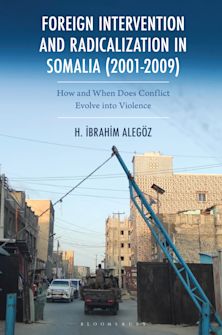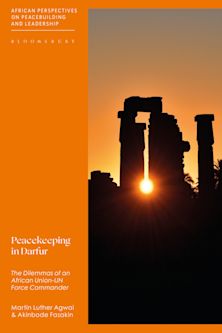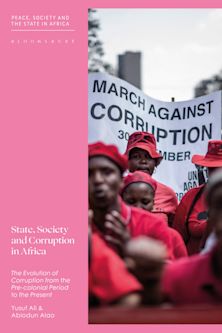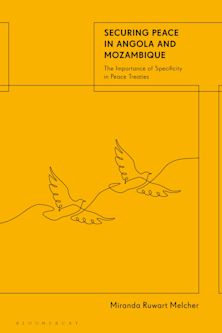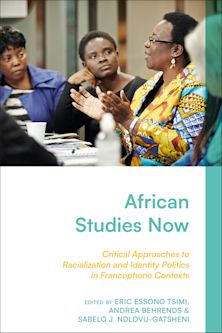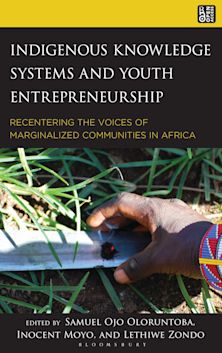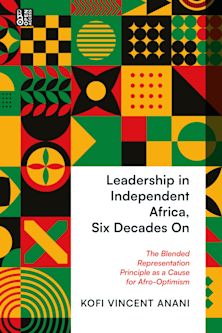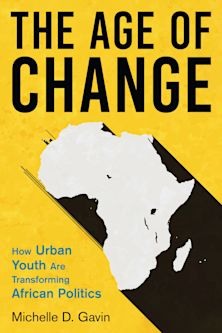- Home
- ACADEMIC
- Politics & International Relations
- African Politics
- Online Learning, Instruction, and Research in Post-Pandemic Higher Education in Africa
Online Learning, Instruction, and Research in Post-Pandemic Higher Education in Africa
Martin Munyao (Anthology Editor) , Samuel Agyapong (Contributor) , Laban Ayiro (Contributor) , Trine Jensen (Contributor) , Evonne Kiptinness (Contributor) , Philip Ayoo (Contributor) , Vincent Kogo (Contributor) , Mike Kuria (Contributor) , Giorgio Marinoni (Contributor) , Winnie Mbatha (Contributor) , Agnes N. Mburu (Contributor) , Fridah Mburu (Contributor) , John Mudegu (Contributor) , Martin Munyao (Contributor) , Justice Mutua (Contributor) , Catherine Mwarari (Contributor) , Rebecca Ng’ang’a (Contributor) , Alicia Plant (Contributor) , Lydia Radoli (Contributor) , Rose Ruto-Korir (Contributor) , Julius Sirima (Contributor) , Nokuthula Vilakati (Contributor) , Serah Wanjiru Wachira (Contributor) , Abraham Waithima (Contributor) , Anthony Wambua (Contributor) , James Karau (Contributor) , Charity Waithima (Contributor) , George John Law (Foreword)
Online Learning, Instruction, and Research in Post-Pandemic Higher Education in Africa
Martin Munyao (Anthology Editor) , Samuel Agyapong (Contributor) , Laban Ayiro (Contributor) , Trine Jensen (Contributor) , Evonne Kiptinness (Contributor) , Philip Ayoo (Contributor) , Vincent Kogo (Contributor) , Mike Kuria (Contributor) , Giorgio Marinoni (Contributor) , Winnie Mbatha (Contributor) , Agnes N. Mburu (Contributor) , Fridah Mburu (Contributor) , John Mudegu (Contributor) , Martin Munyao (Contributor) , Justice Mutua (Contributor) , Catherine Mwarari (Contributor) , Rebecca Ng’ang’a (Contributor) , Alicia Plant (Contributor) , Lydia Radoli (Contributor) , Rose Ruto-Korir (Contributor) , Julius Sirima (Contributor) , Nokuthula Vilakati (Contributor) , Serah Wanjiru Wachira (Contributor) , Abraham Waithima (Contributor) , Anthony Wambua (Contributor) , James Karau (Contributor) , Charity Waithima (Contributor) , George John Law (Foreword)
This product is usually dispatched within 1 week
- Delivery and returns info
-
Free US delivery on orders $35 or over
You must sign in to add this item to your wishlist. Please sign in or create an account
Description
Online Learning, Instruction, and Research in Post-Pandemic Higher Education in Africa, edited by Martin Munyao, argues that beyond survival, universities need to adapt to technology-mediated communication learning in order to thrive. Disruptive technologies have recently proved to be means of thriving for institutions of higher learning. This book reflects on how leveraging on education technology has transformed teaching, learning, and research Higher Education Institutions (HEI) impacting Africa through digital transformation. In particular, HEIs are collaborating more now than ever before. Finally, this book addresses the challenges of teaching STEM programs online in Africa.
Table of Contents
Introduction: Education Beyond the Four Walls
Martin Munyao
Chapter 1: Distance Education that Matters; Creating Sustainable Online Pedagogy
Alicia Plant and Martin Munyao
Chapter 2: Covid-19 Higher Education Driven Elearning: The Digital Divide's Impact on Access and Quality in the EAC Region
Abraham Waithima, James Karau, Mike Kuria, Samuel Agyapong, Charity Waithima, and Philip Ayoo
Chapter 3: Psychology of Online Learning
Catherine N. Mwarari and Agnes N. Mburu
Chapter 4: Opinion and Experience in Regard to Problem-Based Learning in Online Mode
Rebecca Ng'ang'a
Chapter 5: Teaching Problem-Based Learning in the Post-Covid 19 Era in Africa: Challenges and Opportunities for the Online Instructor
John Mudegu
Chapter 6: The Role of Educational Technology and Elearning During Covid-19 Pandemic and its Impact on the Higher Education Sector in Kenya
Laban Ayiro, Martin Munyao, and Anthony Wambua
Chapter 7: “Switching To Side Mode” – Covid-19 and the Adaptation of Computer-Mediated Communi
Product details
| Published | Nov 23 2022 |
|---|---|
| Format | Hardback |
| Edition | 1st |
| Extent | 254 |
| ISBN | 9781666916065 |
| Imprint | Lexington Books |
| Illustrations | 12 b/w illustrations; 9 tables; |
| Dimensions | 9 x 6 inches |
| Publisher | Bloomsbury Publishing |
About the contributors
Reviews
-
The COVID-19 pandemic has taught us that online education is no longer an option but an integral part of learning. This book provides useful insights, solutions, and pathways for making online instruction a reality. I recommend it to all educational actors keen on making education more accessible beyond the four walls.
Caroline Ayuya Muaka, Daystar University
-
Online Learning, Instruction, and Research in Post-Pandemic Higher Education in Africa is a timely compilation that articulates the emerging issues facing the higher education terrain and gives us a glimpse into the future. Many now have to contend with the reality of incorporating online learning as a major part of learning across all disciplines. There is no turning back.
Mwenda Ntarangwi, Calvin College
-
Online Learning, Instruction, and Research in Post-Pandemic Higher Education in Africa is an insightful treatment of the disruption occasioned by the COVID-19 pandemic in the education space, especially in HEIs. The authors have taken a pragmatic approach making it an essential reading for anyone working in Higher Education with specific areas of technology, distance learning and its credibility, mental health challenges and psychosocial support, technology, pedagogy and potential opportunities for closing gaps on education. The writing examines COVID-19 disruption expansively and its implications for practice in education. Dr. Munyao and colleagues have masterfully used their experiences in higher education as well as literature review to shine a bright light on the challenges occasioned by COVID-19, but they have also optimistically painted a picture of possible opportunities to improve various aspects of education. The book also highlights the ugly side of marginalization with suggestions for a reform framework that considers the factors that affect populations that are unable to access technology needed for distance learning. They also raise the question of quality control in delivering distance education. This book should ignite a discussion of the different issues in higher education post-COVID-19 and the experiences and ideas of teachers, administrators, and evaluators throughout Africa. It provides good coverage of the timely topics including psychology of online learning and potential challenges that need solutions. The general strength of this volume is that it puts strong emphasis on practical considerations that lecturers and policy makers are likely to encounter in designing a distance course; it is particularly strong in presenting easily understood principles of good practice for those who must plan and implement distance learning in Higher Education. I highly recommend for anyone seeking to understand challenges and opportunities in higher education post-COVID-19.
Evelyn Jepkemei, Education.org
-
The breadth of the topics covered and the analyses of the authors have satisfied the book’s argument that a mixture of pedagogical skills, educational technology, and institutional collaboration will result in optimum learning outcomes through ODeL than merely transferring the physical classroom experience online as did most HEIs during the pandemic. This indeed is a required addition to every HEI library and the lessons learned in it need to be heeded by all who are involved in ODeL.
African Christian Theology

ONLINE RESOURCES
Bloomsbury Collections
This book is available on Bloomsbury Collections where your library has access.












